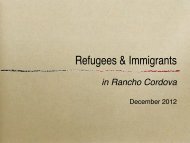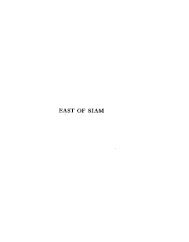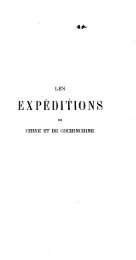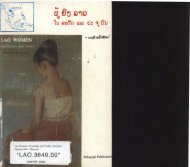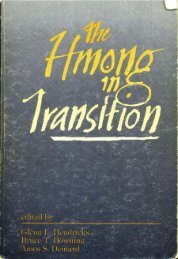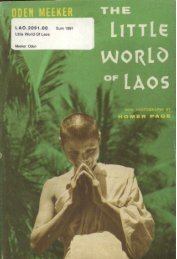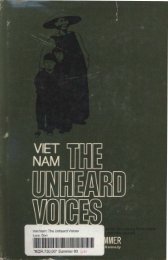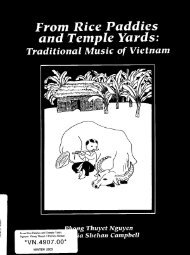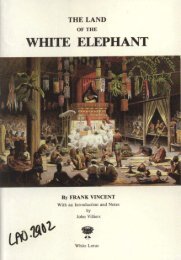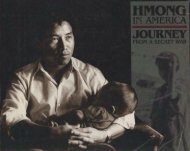PEOPLE
Grant, The Boat People - Refugee Educators' Network
Grant, The Boat People - Refugee Educators' Network
- No tags were found...
You also want an ePaper? Increase the reach of your titles
YUMPU automatically turns print PDFs into web optimized ePapers that Google loves.
The Boat h ple<br />
be left stateless by the rcfusd of other nations to accept them, It k , :<br />
this issue which goes to the heart of the problem of the rcfugtc in .;<br />
the twentieth century.<br />
The rise of the nation-state in the nineteenth century changed thc '<br />
way peoples saw themselves and this tendency has strengthened in<br />
the twentieth century. The great religions of the world have long<br />
resign& themstlva to accepting parity, even inferiority, with the<br />
, '<br />
power of the nation-state, Communism has challenged nationalim<br />
- and lost. The ~rbitrary power of the nation-state over human<br />
beings can k frightening; and it behaves, more often than not,<br />
towards other nation-scates irrationally, refusing to allow the slightest<br />
interference with itself yet demanding the right to interfere with<br />
others, But i~ authority to protect its citizens from outside attack<br />
and, within the nation itself, to prokct thc weak, or the majority, . '<br />
make it a formidable fact of modern life. Weak nation-states arc prey .<br />
to great powers, ideologies and commercial and cultuml tyrannies,<br />
'<br />
all of which, especially in the so~alled 'third world' of developing<br />
nations, havc given the state ample justification for increasing ia<br />
power.<br />
A person who is forccd to live outside the authority of the nationstate<br />
becomes, in the modern world, s person without the rights d '<br />
duties of a citizen. The idea of an4internationa1 citizenship' is attrac-<br />
,<br />
tive in principle, as is the idea of living in isolation in a utopian em- ..<br />
munity. But each is a way of opting out of the issues posed by the<br />
j<br />
'<br />
hat people who, like the Indo-Chinese rcfupes generally, are too ,<br />
intensely connected with the forces of history and politics that have<br />
erupted to displace them, for them to become citizens in limbo, sani- . ,<br />
tized against time and place. If kept in anonymous camps or process- i<br />
ing centres indefinitely, they are more likely to become diwffd<br />
than to become citizens of the world, It is from the interplay of<br />
people and nations in the real world that solutions to the real prob- ,<br />
lcms of refugees are likely to come.<br />
It is imperative, therefore, for nation-states to kome more .<br />
inclusive, less exclusive, if it is to be within the nation-state iwlf :,<br />
that h e problems of the wentiah century arc to k solved. This is '6<br />
not to deny the need for international organizations, such as the<br />
United Nutions, which is valuable, indeed indispensable, M<br />
instrurnenr of conciliation and, sometimes, &dve organization. '<br />
i<br />
The UNHCR is a case in point, But without a growth of civilizing<br />
valua within states, the United Nations is no more h n decoration,<br />
s vine that covers hard stone. As remarked wrlier, the number of<br />
refugees in the world is growing and they are now predominantly<br />
from Africa, the Middle East, Latin America and hia. If they are<br />
to be resettled, there will need to be major changes in the attitudes<br />
of all nationa especially in racial and cultural tolema, as the backgrounds<br />
of the refugees are likely m be very different from thw<br />
of people in the probable countria of rcsettlemmt.<br />
Both the fierce nationalism of Vietnam and the nationalism of<br />
affluence of the industrial dmoaacies have becn shown by the story<br />
of the boat people to be inadequate. Vietnam's nationalism, which<br />
is one of its sQengths, causa tension within itself and uneasiness<br />
without: it is not a model for developing countries in South-East<br />
Asia, which generally have a more pragmatic attitude to international<br />
influenccs and currents of life in the wider world. One of<br />
the several tragic consequences of Vietnam's conflict with China is<br />
that its nationalism, which needs to be moderated, has been<br />
inflamed.<br />
The nationalism of the western democracies, which makes them<br />
loath to share their wealth and social organization with pcople from<br />
poor countries - so that they will accept refugees with racial or culrural<br />
backgrounds similar to their own, but not from Africa or Asia<br />
- is no mdcl for the rest of this century, either. Communist states<br />
have perhaps the poorest record of all, although, as the trafic is away<br />
from them rather than towards them, they have not yct been<br />
seriously tested, Communist states have played politics with refugees,<br />
admitting only hose who= ideological credentials are acceprable<br />
and ignoring the international problem as such. One of the<br />
interesting effects of the exodus of refugees from IndoChina is that,<br />
because its causes art complex, md praise and blame is not easily<br />
apportionable, and because also its political and saategic implications<br />
are sensitive and serious, the communist states, including the<br />
USSR, havc been drawn into discussions, This, at least, is hopeful<br />
because it is unlikely that Vietnam will bc the last country in which<br />
a refugee crisis follows revolution.<br />
During the writing of the story of the boat people, analogia and<br />
metaphors kept coming to mind - and king discarded. The Nazi<br />
206





